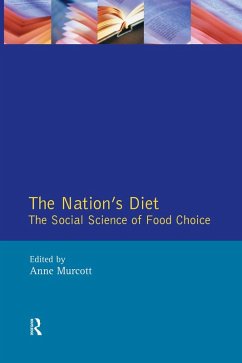60,95 €
60,95 €
inkl. MwSt.
Sofort per Download lieferbar

30 °P sammeln
60,95 €
Als Download kaufen

60,95 €
inkl. MwSt.
Sofort per Download lieferbar

30 °P sammeln
Jetzt verschenken
Alle Infos zum eBook verschenken
60,95 €
inkl. MwSt.
Sofort per Download lieferbar
Alle Infos zum eBook verschenken

30 °P sammeln
- Format: PDF
- Merkliste
- Auf die Merkliste
- Bewerten Bewerten
- Teilen
- Produkt teilen
- Produkterinnerung
- Produkterinnerung

Bitte loggen Sie sich zunächst in Ihr Kundenkonto ein oder registrieren Sie sich bei
bücher.de, um das eBook-Abo tolino select nutzen zu können.
Hier können Sie sich einloggen
Hier können Sie sich einloggen
Sie sind bereits eingeloggt. Klicken Sie auf 2. tolino select Abo, um fortzufahren.

Bitte loggen Sie sich zunächst in Ihr Kundenkonto ein oder registrieren Sie sich bei bücher.de, um das eBook-Abo tolino select nutzen zu können.
'Why we eat what we eat?' is a key question for the 1990s, posed again and again in government departments, in sectors of the food industry, by professionals in health, in education, and in catering, to name a few.
- Geräte: PC
- mit Kopierschutz
- eBook Hilfe
- Größe: 6.76MB
Andere Kunden interessierten sich auch für
![Feminism and the Power of Law (eBook, PDF) Feminism and the Power of Law (eBook, PDF)]() Carol SmartFeminism and the Power of Law (eBook, PDF)60,95 €
Carol SmartFeminism and the Power of Law (eBook, PDF)60,95 €![Welfare Rights and Social Policy (eBook, PDF) Welfare Rights and Social Policy (eBook, PDF)]() Hartley DeanWelfare Rights and Social Policy (eBook, PDF)60,95 €
Hartley DeanWelfare Rights and Social Policy (eBook, PDF)60,95 €![Rights at Stake and the COVID-19 Pandemic (eBook, PDF) Rights at Stake and the COVID-19 Pandemic (eBook, PDF)]() Rights at Stake and the COVID-19 Pandemic (eBook, PDF)41,95 €
Rights at Stake and the COVID-19 Pandemic (eBook, PDF)41,95 €![Crime and Social Policy (eBook, PDF) Crime and Social Policy (eBook, PDF)]() Mike StephensCrime and Social Policy (eBook, PDF)29,95 €
Mike StephensCrime and Social Policy (eBook, PDF)29,95 €![Crime in Europe (eBook, PDF) Crime in Europe (eBook, PDF)]() Crime in Europe (eBook, PDF)51,95 €
Crime in Europe (eBook, PDF)51,95 €![Handbook of Research with Lesbian, Gay, Bisexual, and Transgender Populations (eBook, PDF) Handbook of Research with Lesbian, Gay, Bisexual, and Transgender Populations (eBook, PDF)]() William MeezanHandbook of Research with Lesbian, Gay, Bisexual, and Transgender Populations (eBook, PDF)102,95 €
William MeezanHandbook of Research with Lesbian, Gay, Bisexual, and Transgender Populations (eBook, PDF)102,95 €![Traffickers (eBook, PDF) Traffickers (eBook, PDF)]() Nicholas DornTraffickers (eBook, PDF)51,95 €
Nicholas DornTraffickers (eBook, PDF)51,95 €-
-
-
'Why we eat what we eat?' is a key question for the 1990s, posed again and again in government departments, in sectors of the food industry, by professionals in health, in education, and in catering, to name a few.
Dieser Download kann aus rechtlichen Gründen nur mit Rechnungsadresse in A, B, BG, CY, CZ, D, DK, EW, E, FIN, F, GR, HR, H, IRL, I, LT, L, LR, M, NL, PL, P, R, S, SLO, SK ausgeliefert werden.
Produktdetails
- Produktdetails
- Verlag: Taylor & Francis eBooks
- Seitenzahl: 398
- Erscheinungstermin: 8. Oktober 2018
- Englisch
- ISBN-13: 9781317884811
- Artikelnr.: 55682702
- Verlag: Taylor & Francis eBooks
- Seitenzahl: 398
- Erscheinungstermin: 8. Oktober 2018
- Englisch
- ISBN-13: 9781317884811
- Artikelnr.: 55682702
- Herstellerkennzeichnung Die Herstellerinformationen sind derzeit nicht verfügbar.
Anne Murcott
1. Introduction: Food Choice, Social Sciences and 'The Nation's Diet'
Programme.
Part One: Social Sciences and Food Choice: Proceeding from Axioms,
Operational Definitions and Measurements.
2. The Effects of Life Stress on Food Choice. 3. Understanding Dietary
Choice and Dietary Change: Contributions from Social Psychology. 4.
Changing What Children Eat. 5. Consumer Theory and Food Choice in
Economics, with an Example. 6. What We Eat and Why: Social Norms and
Systems of Provision. 7. How British Retailers Have Shaped Food Choice. 8.
A Sociological Approach to Food Choice: The Case For Eating Out.
Part Two: Social Sciences and Food Choice: Analysing Socio-political
Processes and Cultural Constructions.
9. Regulation, Rights and the Structuring of Food Choices. 10. Studying
Food Choice in its Social and Cultural Contexts: Approaches from a Social
Anthropological Perspective. 11. Food Choice and Diet Change Within the
Family Setting. 12. The Marriage Menu: Life, Food and Diet in Transition.
13. Ethnographies of Eating in an Urban Primary School. 14. Food Choice,
Food Scares, and Health: the Role of the Media. 15. Food Choices for
Babies. 16. Food Choice and Culture in a Cosmopolitan City: South Asians,
Italians and other Glaswegians.
Part Three: Social Sciences and Food Choice: Additional Perspectives.
17. Food Choice and the British System of Formal and Informal Welfare
Provision: Questions for Research. 18. British Market-Research Data on
Food: a Note on Their Use For the Academic Study of Food Choice. 19. The
Discourse of Scientific Knowledge of Nutrition and Dietary Change in the
Twentieth Century. References.
Index of Authors. Index of Principal Topics.
Programme.
Part One: Social Sciences and Food Choice: Proceeding from Axioms,
Operational Definitions and Measurements.
2. The Effects of Life Stress on Food Choice. 3. Understanding Dietary
Choice and Dietary Change: Contributions from Social Psychology. 4.
Changing What Children Eat. 5. Consumer Theory and Food Choice in
Economics, with an Example. 6. What We Eat and Why: Social Norms and
Systems of Provision. 7. How British Retailers Have Shaped Food Choice. 8.
A Sociological Approach to Food Choice: The Case For Eating Out.
Part Two: Social Sciences and Food Choice: Analysing Socio-political
Processes and Cultural Constructions.
9. Regulation, Rights and the Structuring of Food Choices. 10. Studying
Food Choice in its Social and Cultural Contexts: Approaches from a Social
Anthropological Perspective. 11. Food Choice and Diet Change Within the
Family Setting. 12. The Marriage Menu: Life, Food and Diet in Transition.
13. Ethnographies of Eating in an Urban Primary School. 14. Food Choice,
Food Scares, and Health: the Role of the Media. 15. Food Choices for
Babies. 16. Food Choice and Culture in a Cosmopolitan City: South Asians,
Italians and other Glaswegians.
Part Three: Social Sciences and Food Choice: Additional Perspectives.
17. Food Choice and the British System of Formal and Informal Welfare
Provision: Questions for Research. 18. British Market-Research Data on
Food: a Note on Their Use For the Academic Study of Food Choice. 19. The
Discourse of Scientific Knowledge of Nutrition and Dietary Change in the
Twentieth Century. References.
Index of Authors. Index of Principal Topics.
1. Introduction: Food Choice, Social Sciences and 'The Nation's Diet'
Programme.
Part One: Social Sciences and Food Choice: Proceeding from Axioms,
Operational Definitions and Measurements.
2. The Effects of Life Stress on Food Choice. 3. Understanding Dietary
Choice and Dietary Change: Contributions from Social Psychology. 4.
Changing What Children Eat. 5. Consumer Theory and Food Choice in
Economics, with an Example. 6. What We Eat and Why: Social Norms and
Systems of Provision. 7. How British Retailers Have Shaped Food Choice. 8.
A Sociological Approach to Food Choice: The Case For Eating Out.
Part Two: Social Sciences and Food Choice: Analysing Socio-political
Processes and Cultural Constructions.
9. Regulation, Rights and the Structuring of Food Choices. 10. Studying
Food Choice in its Social and Cultural Contexts: Approaches from a Social
Anthropological Perspective. 11. Food Choice and Diet Change Within the
Family Setting. 12. The Marriage Menu: Life, Food and Diet in Transition.
13. Ethnographies of Eating in an Urban Primary School. 14. Food Choice,
Food Scares, and Health: the Role of the Media. 15. Food Choices for
Babies. 16. Food Choice and Culture in a Cosmopolitan City: South Asians,
Italians and other Glaswegians.
Part Three: Social Sciences and Food Choice: Additional Perspectives.
17. Food Choice and the British System of Formal and Informal Welfare
Provision: Questions for Research. 18. British Market-Research Data on
Food: a Note on Their Use For the Academic Study of Food Choice. 19. The
Discourse of Scientific Knowledge of Nutrition and Dietary Change in the
Twentieth Century. References.
Index of Authors. Index of Principal Topics.
Programme.
Part One: Social Sciences and Food Choice: Proceeding from Axioms,
Operational Definitions and Measurements.
2. The Effects of Life Stress on Food Choice. 3. Understanding Dietary
Choice and Dietary Change: Contributions from Social Psychology. 4.
Changing What Children Eat. 5. Consumer Theory and Food Choice in
Economics, with an Example. 6. What We Eat and Why: Social Norms and
Systems of Provision. 7. How British Retailers Have Shaped Food Choice. 8.
A Sociological Approach to Food Choice: The Case For Eating Out.
Part Two: Social Sciences and Food Choice: Analysing Socio-political
Processes and Cultural Constructions.
9. Regulation, Rights and the Structuring of Food Choices. 10. Studying
Food Choice in its Social and Cultural Contexts: Approaches from a Social
Anthropological Perspective. 11. Food Choice and Diet Change Within the
Family Setting. 12. The Marriage Menu: Life, Food and Diet in Transition.
13. Ethnographies of Eating in an Urban Primary School. 14. Food Choice,
Food Scares, and Health: the Role of the Media. 15. Food Choices for
Babies. 16. Food Choice and Culture in a Cosmopolitan City: South Asians,
Italians and other Glaswegians.
Part Three: Social Sciences and Food Choice: Additional Perspectives.
17. Food Choice and the British System of Formal and Informal Welfare
Provision: Questions for Research. 18. British Market-Research Data on
Food: a Note on Their Use For the Academic Study of Food Choice. 19. The
Discourse of Scientific Knowledge of Nutrition and Dietary Change in the
Twentieth Century. References.
Index of Authors. Index of Principal Topics.







